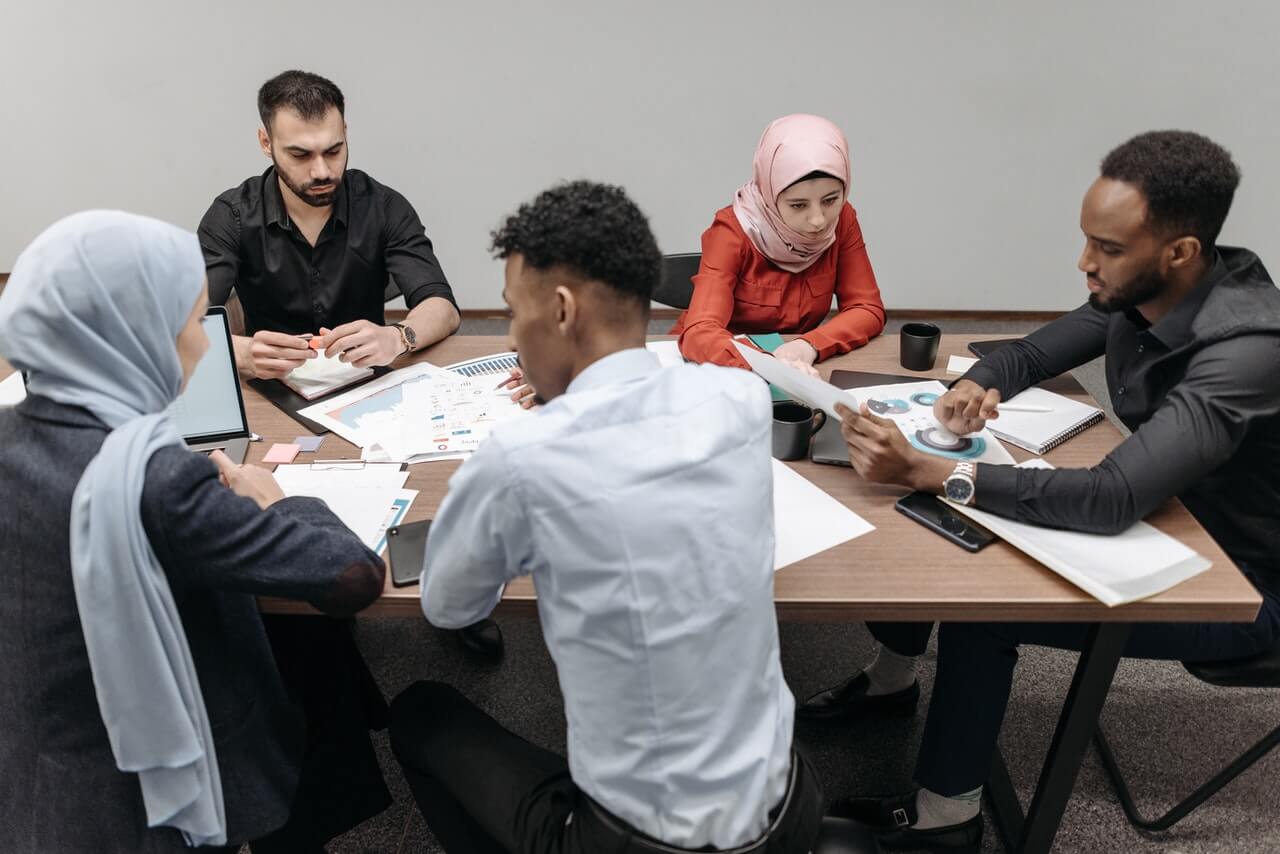Frequently Asked Questions About Peer Coaching Groups (PCGs)
We assume that you have already read the information on the page Start a Virtual Support Group to Help With Stresses of COVID-19. The information on that page would answer all of the typical questions about planning and operating a support group. However, the following questions still tend to get asked. The phrases “support group” and “peer coaching group” (PCG) are used interchangeably.
About the PCG Process
About Membership
About Facilitating
About Coaching
About Modifying the PCG Process
About Using Materials and Getting Help
Who Are the “Peers” in PCGs?
All members are “peers” in that they come together as equals to support every member’s progress during the group’s meetings. Thus, in a PCG intended as a support group, you could have a senior executive from one company with a secretary from another company — and they’d still be peers in the group.
How Are the PCGs So Good at Helping Members to Support Each Other?
Support means more than letting people express their feelings — and affirming and validating them, as well. It also means helping people to perceive their situations differently and to act on those situations. PCGs are great for helping people to do all of that. In PCGs around the world over the past two decades, members often report that networking and support are the two biggest outcomes that they are getting from each other.
How Can People Feel Safe and Accepted in PCGs?
All of the members in the PCG have something in common — they all understand each other’s situation. Members also share biographies and introductions with each other. The ground rules (that are asserted at the beginning and end of each meeting) ensure confidentiality, that all opinions are honored and that members can respectfully disagree with each other.
However, the most powerful experience of safety and acceptance for each member is when he or she is getting help from other members in each meeting. Help is in the form of nonjudgmental feedback, advice and thoughtful questions, as well as contacting each other between meetings.
Are PCGs Really Just Therapy Sessions?
No. PCGs are focused on each member’s current priority in life or work, and about what he or she can realistically do about it before the next group meeting. Unlike therapies, PCGs are not focused on continuing to analyze each member’s past in order to address a strong, recurring emotional and/or mental problem that has had a significant and adverse effect on the member’s life. (Note that some approaches to therapy, for example, Carl Roger’s self-directed therapy, would seem somewhat similar to the approach used in support groups.)
Don’t I Have to Be a Therapist to Do a Support Group?
No. There is a large number of support groups started by the members themselves. Many of the topics correspond to the vast range of medical maladies that many people experience around the world. In those groups, members help each other by doing what many people do with their friends: they listen, they affirm, they encourage and they empower.
How is the PCG Process Evaluated?
Near the end of group meeting, each member shares out loud, a rating of the quality of that meeting from “1” (very low) to “5” (very high), and what he or she could have done during that meeting in order to improve that meeting. Also, more comprehensive evaluations can be done half-way through the number of meetings and shortly after the last meeting.
Where Can I Get Members for My PCG?
There are millions of people concerned about the virus and many of them have concerns like these. To recruit two to four people for your group, you could reach out to your friends, neighbors, members of organizations that you belong to, contacts in your social media groups and contacts in your email. Give them the Web address of this page Help Each Other Deal With COVID-19 Impacts and ask them to read the “Introduction.” It concisely explains the need for support groups and how they could be so very helpful.
I Want to Join a PCG. Can You Help Me?
At this point, we are not equipped to manage a waiting list of facilitators and potential group members, and then to begin matching them together. Thus, we are counting on people to self-organize their own groups now. (If you’ve got ideas, we’d love to hear them.)
How Can a Person Know If They’ll Be a Suitable PCG Member?
If a person isn’t sure whether they would be comfortable in a PCG process, then read this article and decide:
What Do I Do When I Facilitate?
The specific tasks of the facilitator are itemized in the section “Facilitation Tasks” in the Quick Reference. There are even more specific talking points in facilitating through a Quick Reference in the document:
Where Can I Learn Even More About Facilitating PCGs?
In addition to the tasks in the section “What does the facilitator do?” in the Circles Quick Reference, the facilitator could review the guidelines in the following document:
That document is about when to intervene, what to do if the process is not working for some members, how to deal with conflict, how to address problems in attendance and participation, how to remove and add members, and how to deal with strong emotions.
How Do I Know What Priority to Get Coached On?
Choose whatever priority is most important to you now. You are the expert at what is most important to you. Do not worry about how small or large in scope that the priority is. Your priority can change from one meeting to another.
What is “Coaching” in Each Meeting?
Coaching is the nature of the help that members use to help each other in their meetings, whether it is advice, brainstorming or thoughtful questions.
NOTE: There are strong feelings, especially among practitioners in the profession of personal and professional coaching, that coaching is only the asking of thoughtful questions. Thus, they might strongly disagree with the above definition of coaching. However, the goal of PCGs for support is to be helpful to each member according to their nature and current needs in their meetings.
What Are Some Coaching Approaches (or Models) to Use in PCGs?
There is a vast number of coaching models available to practitioners today. Many of them pertain primarily to one-on-one coaching formats. However, in a group format like PCGs, there are several people coaching concurrently and their time is limited for all of them together. Thus, it is often best to use models that are simple and straightforward to use in a group.
Two examples are “Head, Heart, Hands,” meaning to ask questions about what the member thinks and then feels, but then always what he or she will do (for example, with the hands). Another example is “Caring, Curious and Concise,” meaning that all questions should come from a place of caring and curiosity regarding the member who is currently getting coached in a meeting. Also, because of the tight time frame in a meeting, all questions should be posed concisely to the member.
How Do I Know What Kind of Help to Give a Member?
You might ask the member who is currently getting help during the “Coaching Time Slots” part in the meeting. For example, ask “What kind of help would be most useful to you now? Advice? Materials? Questions? Brainstorming?”
What If a Member Finishes Their Time Slot Early?
Each time slot should include the member’s selecting at least one realistic action to take before the next meeting. If a member believes that he or she has finished the coaching because an action was selected already, then the member should get coached on how that action could occur. The coaching should continue until all of the member’s allotted time has been used.
What is “Successful” Coaching?
A member is doing successful coaching if he or she is continually attending to the member who is currently getting helped. Successful coaching does not mean that the member’s priority or problem has been successfully solved.”
How Do I Know What Actions to Take Between Meetings?
The actions that you take (as a result of the help that you get from other group members) is up to you to select. However, it should be an action that is realistic to accomplish before the next meeting.
How Much Can I Modify the Process?
You can modify the process to suit the nature of needs of your members. However, you should always retain:
1) individual time for each member to get coached in each meeting,
2) verifying that each member’s actions from the coaching are indeed realistic, and
3) an evaluation activity in each meeting that requires each member to rate (out loud) the quality of each meeting.
How Can I Modify the PCG to Suit My Culture?
If you believe that your members would benefit from having the PCG process adapted to a particular culture. then use the guidelines in this article:
How Do Members Do Virtual PCGs?
See the section Select Which Virtual Technologies to Use.
Can I Use Your Materials in My Group?
All of the resources marked with the Creative Commons terms on the bottom can be freely shared.
Where Can I Get Help?
See Sources of Help
(In order of above photos, courtesy of Pixabay, Prateek and Tembella Bohle on Pexels.htm)
For the Category of Personal Development:
To round out your knowledge of this Library topic, you may want to review some related topics, available from the link below. Each of the related topics includes free, online resources.
Also, scan the Recommended Books listed below. They have been selected for their relevance and highly practical nature.















